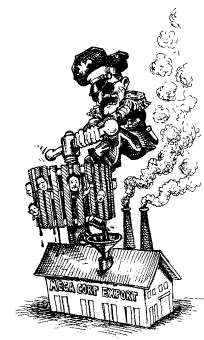|

"So the U.S.
government provided aid. The army and police were decked out in style,
officers were trained in Louisiana, arms were provided from firms in Connecticut."
|
Printing - A Third World Example
Our two
examples have both been in developed settings, whether capitalist or
participatory. Now imagine visiting an island country that has combined
public ownership of the means of production with central planning in an
underdeveloped economy. How might a printing establishment there compare to
how it was before the antiimperialist revolution? How might a transformation
to participatory economics bring further changes?
Assume
that more pressing investment priorities and capitalist boycotts have left
printing technology unchanged from neocolonial days. The plant includes two
out -of -date printing presses, one using cold type and the other geared for
old -fashioned photo -typesetting; banks of equipment of diverse lineage for
stripping negatives and preparing type; layout rooms; assorted equipment for
preparing negatives; space for storing paper and materials; space for storing
incoming and outgoing copy; loading docks, and a lunch counter. What kind of
work was done before and after the anti -colonialist revolution? What kind
might be done after a transformation to participatory economics?
Newsday Press - The Neocolonized Version
Before
the revolution, Simon Bolivar Press was called Newsday Inc. and its product
was the U.S. magazine Newsday. All its engineers were
from the U.S., and while many of its managers were from the island, almost
all were trained in the U.S. Newsday Inc. was 80 percent owned by capitalists
in New York and 20 percent by local capitalists who spent much time in Miami
and Las Vegas.
What to
produce, for whom, by what methods, work pace, and remuneration was decided
by the local owners in consultation with the majority owners in the States.
As a result, Newsday Inc.'s product had little economic, intellectual, or
entertainment value for the island's citizens. Darker -skinned workers and
women did the worst jobs. Marginal attention went to quality of work life.
When
fumes, pace, tension, noise, or overbearing management wore down one set of
employees, they were fired and new islanders were hired to replace them. To
provide carrots alongside the stick, the top jobs for islanders paid enough
to support a middle class life, while bottom levels paid bare subsistence.
Yet, as long as one could last, work at Newsday Inc. beat hell out of
unemployment, begging, going back to one's family in a rural village, or
starving. Profits were exported to New York or Miami, or spent to sustain the
luxurious lifestyle of the indigenous elite.
Of
course, to maintain the tranquility of Newsday Inc. and the island's largely
U.S -owned casinos, plantations, and import businesses, more was required.
Remaining funds, after outsiders took their share, were insufficient to
support and maintain the island's all -important military, police apparatus,
and public services sufficiently to keep the system afloat. Something had to
be done.
So the
U.S. government provided aid. The army and police were decked out in style,
officers were trained in Louisiana, arms were provided from firms in
Connecticut. Officers received relatively high salaries in addition to being
allowed to go berserk every so often to "improve morale" and
enforce fear. The "legitimate" bill for all this plus ample bribes
and overcharges was paid with funds from Washington raised from U.S. taxpayers.
Services of use to local owners and U.S. visitors were maintained. The rest
went to hell in a handcart. As repression increased, so did aid, this
correlation being the most tenacious in U.S. international affairs since more
repression means a more exploitable work force and higher profits for U.S.
companies, and therefore more reason to send aid to buy more goodies for
lackeys and arms for police and to pay more gravediggers.
Ultimately
some of the island's more courageous citizens raised the consciousness and
sparked the hopes of enough citizens to sustain a popular struggle against
imperialism and throw out local and absentee rulers. Since victory, however,
times have been tough. A vindictive economic boycott has isolated the country
and made rebuilding difficult. Progress has had to wait on the task of
overcoming the imperialist legacy of deprivation, ignorance, crime, and
degradation. Nonetheless, the revolutionary movement consolidated power and
transformed island life.
|